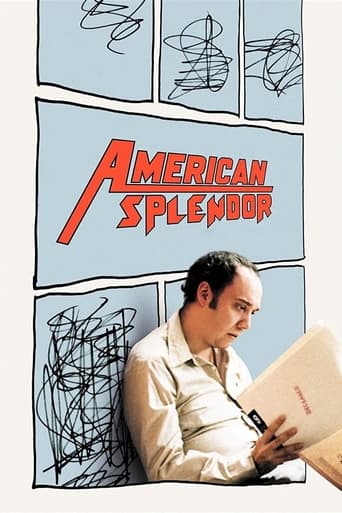Tetrady
not as good as all the hype
PlatinumRead
Just so...so bad
Teddie Blake
The movie turns out to be a little better than the average. Starting from a romantic formula often seen in the cinema, it ends in the most predictable (and somewhat bland) way.
Cristal
The movie really just wants to entertain people.
estebangonzalez10
"If you're the kind of person looking for romance or escapism or some fantasy figure to save the day... guess what? You've got the wrong movie."From the very opening scene co-directors, Shari Springer Berman and Robert Pulcini, present us with a rather unconventional film by blending a feature narrative with documentary style footage. Through voice over narration, Harvey Pekar, introduces his character played by Paul Giamatti as an ordinary man living a complex and depressing life. So while this biopic follows a traditional narrative style, it also interrupts it by showing documentary footage of the real people being portrayed in the film explaining the events that took place. The film also includes animation throughout the narrative from Pekar's underground comics, so from the opening credits the audience is introduced to a very different, but clever biopic. Paul Giamatti gives one of his best performances to date and I was glad to finally see him play a lead role. If you are a fan of his work, than by no means will you want to miss this film because his portrayal of Harvey Pekar is perfectly captured in a very natural way. There is nothing ordinary about the character Paul plays, Harvey has a very depressive and unique view on life, and the way he portrays the normal events of his life are told in a sour but hilarious way. Harvey's story alone is worth knowing, but the way the film combines the different styles in this movie make it stand above other traditional biopics.The film tells the true story of Harvey Pekar (Paul Giamatti), an ordinary man living in Cleveland and working as a filing clerk in a VA hospital. He seems to get through each depressing day thanks to his enthusiasm for music and comic books, which he collects. One day while searching for LPs at a garage sale, he meets Robert Crumb (James Urbaniak). They become friends through their passion for jazz music and comics, and eventually Crumb becomes a famous comic book author. This inspires Harvey to begin writing about his ordinary life, and through his unique and dark sense of humor he eventually begins to have some underground success. American Splendor is the title he gives to his autobiographical graphic novels which narrate the common events that take place in his life. In his work he often includes his interesting co-workers: the autistic Toby Radloff (Judah Friedlander), and the veteran Mr. Boats (Earl Billings), with whom he shares hilarious interactions. Thanks to the success of his comic he also gets to meet his future third wife, Joyce Brabner (Hope Davis), and their depressing relationship also becomes an important part of his work. These interactions about the working class and Pekar's way of telling them are the heart of this biopic.In a way American Splendor's sense of humor reminds me a lot of Seinfeld, although Pekar's vision of life is far more depressing. The blending of documentary footage and narrative feature works thanks to Giamatti's spot on performance. Having the real Harvey Pekar and the actor portraying him in the same film could have been a disaster, but Giamatti captures his mannerisms so well that it works and takes this character study to a higher level. I also thought the secondary characters in this film were all very interesting. They were all so quirky and different, but their interactions with Harvey made for some funny material. One of the scenes that stood out for me was the scene where Harvey and Toby are criticizing The Revenge of the Nerds movie. American Splendor is a very innovative and odd film and one worth checking out despite lacking some better pacing at times. Still it stands out by combining fact with fiction in a very creative and funny way.
TheExpatriate700
American Splendor is an excellent film exploring the life of the late Harvey Pekar, the comic book writer who documented his working class life in a series of graphic novels. The film combines stylistic innovations with two excellent performances by Paul Giamatti and Hope Davis, both of whom give Oscar worthy performances.The most striking part of the film is its mimicking of the comic book format, through the use of on-screen divides between scenes, as well as animated depictions of Pekar's comic book. These give the film visual verve, while capturing Pekar's work in a way that a traditional biographical approach could not.Even more important are the excellent performances by Giamatti and Davis, which anchor the entire film. They embody their characters (and their real life counterparts) in such a way that they come alive for the viewer.Most importantly, the film captures the tedium and ugliness of working class life which was the heart of Pekar's graphic novels. Pekar's mundane existence as a file clerk lies at the center of the movie, ignoring the tendency to pretty things up in Hollywood films. Thus, this film belongs on every comic book lover's shelf, next to Crumb.
calvinnme
This is really a great film about Harvey Pekar, the underground comic book writer who created the comic book series "American Splendor". I'm surprised this movie hasn't garnered more critical attention than it has. The movie basically takes you from the end of Harvey's second marriage up to the point of his retirement as a file clerk. Pekar is living a life of quiet desperation - everything in his life is generic. The film lends a dingy quality to Pekar's surroundings that really gives it that "garage sale" look right down to the light fixtures in his apartment. Even the supermarkets and restaurants Harvey frequent make K-mart look classy. Unlike his friends and coworkers though, he is painfully aware of the reality of his life. He has a moment of clarity one day while waiting in line at the grocery store behind a woman who is arguing over why she should pay 1.50 for six glasses that are marked two dollars, when he thinks of a way to strike out at all of this - he decides to document his feelings in a comic. Unfortunately, Harvey can't draw. He comes up with the narrative, but is only able to show stick figures as the actual characters in the drawings. Harvey's big break is that he has become friends with underground comic Robert Crumb before Crumb was famous and the two were just a couple of "ordinary" guys looking for bargains at Cleveland rummage sales. Crumb is impressed with the statement Harvey is trying to make and agrees to do the illustrations, thus the comic "American Splendor" is born.To me, the best part of this movie is the love story between Harvey and his third wife Joyce. These two people are just weird enough to make it work. What makes it work is that they have staked out their own individual claims to different enough territories in the land of weird that their respective neuroses don't bump into one another too badly, as had happened in Harvey's past marriages. Harvey is a man who has very un-mundane statements to make about his mundane world, but doesn't have any real illusions about changing it. Joyce is a self-diagnosed depressed anemic who has memorized the DSM 3 and is therefore happy to diagnose people with personality disorders and then pretty much takes them as she finds them, in spite of her claims of being a reformer. Because neither one wants to change the other, the relationship works.The film is really cleverly done, with comic book illustrations showing what Pekar is thinking in various situations along with narration and a couple of interviews with the actual Pekar and his wife interspersed throughout the film giving it a real feeling of authenticity. Paul Giamatti is simply marvelous as the caustic "warts and more" Harvey Pekar. How often do you see an actor share the screen with the person he is playing, as happens in this film, and not even notice a blip in continuity? His performance is that good. Giamatti certainly deserves better than playing supporting roles in films like "Big Fat Liar". Kudos also to James Urbaniak for his small role as artist and illustrator Robert Crumb. For the small amount of time he is on the screen he really captures the essence of the guy.
Movie_Muse_Reviews
Comic book writer Harvey Pekar would probably be the first to tell you that he only agreed to a movie about himself for the money. He denounces all things glamorous or idealistic and a moving biopic about his life would contradict him entirely. That's why Shari Springer Berman and Robert Pulcini's choice to do an off-center biopic on Pekar in a quasi-documentary style is such a phenomenal direction for their film."American Splendor" features both Pekar himself doing a few on-the-set interviews and voice over narration as well as Paul Giamatti playing out key scenes in his life from befriending fellow artist Robert Crumb to meeting his wife Joyce (Hope Davis) to his odd string of appearances on David Letterman. It's not totally committed to one style over another which is its greatest strength and a bit of a weakness. Although it's so interesting to be able to compare the acting to the real people, at times it's distracting and breaks the illusion. For example, the real Pekar and his semi-autistic pal Toby chat on the movie's set while both actors playing them (Giamatti and Judah Friedlander) take five in the background.Rarely -- and certainly not this extensively -- does a film open itself up to scrutiny like "American Splendor" by allowing the audience to see both reality and its own fiction. Giamatti's performance becomes critically vulnerable with the real Pekar getting almost as much time on screen as he has, though he does do a good job juggling Pekar's many quirks from his dying voice to his tendency to add "man" to the end of every statement."American Splendor" also offers a few other unique directorial choices and sequences such as comic frames in the beginning to replicate comic books and including animated Harveys and thought bubbles into live action. These are generally effective, but they lack continuity. Each scene where traditional cinema is broken get its own treatment; the shift from biopic to documentary is the only constant.Consequently, we've never gotten acquainted with the focal character of another biographical film like we get to know Harvey Pekar. I think anyone who watches the film and happens to meet Harvey afterward would feel like they'd known him for years. Part of it is his natural, quirky predictability, but the other is Berman and Pulcini's decision to give us a healthy dose of the man himself.Much like his American Splendor comics, the story of Harvey Pekar isn't extraordinary or fascinating but down to earth. Pekar didn't want to be anything but ordinary and he just happened to really like the underground comic scene. The film honors that wish by being the same way, so taking the title of the comics and using it for the movie is more than fitting. It had to be a challenge to adapt someone's autobiographical comic and make a biographical documentary about the person who wrote said comic about himself, but Berman and Pulcini make it work and in a highly original and inspiring way. ~Steven CVisit my site at http://moviemusereviews.blogspot.com

